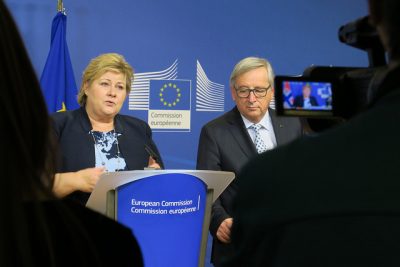Norwegian Prime Minister Erna Solberg, who’s long wanted Norway to join the European Union (EU) and thus have a say in forming its policy, was blunt on Thursday about why she thinks British voters will regret an exit. As a non-member and a small country, Norwegians are “used to others deciding” over their own country, Solberg told newspaper Dagsavisen, while the British are not.

The British, Solberg noted, won’t like having to go along with EU policy without having any influence over it. And that’s what will happen, she continued, if the British leave the EU but also want to retain access to its inner market.
“We’re a small country, not a large empire, with a different sort of faith in ourselves,” Solberg told newspaper Dagsavisen on Thursday. “As a small country we’re used to others deciding.”
Norway, along with other non-member European countries, had to secure an agreement with the EU (called the EØS avtale) in order to maintain access to the EU’s inner market. It requires Norway to pay hundreds of millions of euros to the EU every year while also adhering to EU rules and regulations.
Britain will also need to strike such an agreement with the EU if voters decide on Thursday to give up their EU membership. Solberg said she’s already warned British colleagues that they also risk having to abide by EU rules in order to gain market access, without being able to influence those rules any longer if they revoke their EU membership.
Norway, she told Dagsavisen, has “needed the (EU) market access that EØS gives us, but I have believed all along (since the EØS deal was struck in 1994, when Norwegians last voted to remain outside the EU) that the EØS agreement leaves Norway with a democratic loss.”
Outsiders
Since 1994, Norwegian government ministers, other Norwegian politicians and not least Norwegian lobbyists have been relegated to the corridors in Brussels. Since they’re from a non-member country, they’re banned from meetings and certainly from voting on EU proposals, even though Norway now ranks as among the largest financial contributors to the union and must implement the proposal that become EU law.
“The British won’t like the Norwegian model with our EØS agreement,” Solberg told Dagsavisen. They would go, she warned, “from a situation where you’re part of making decisions to standing outside and only accepting what the other (member) countries have decided.”
Asked why Norway entered into the EØS agreement 22 years ago, Solberg said it was because Norway is “a small country” and basically had no choice if it still wanted to export its oil, salmon, timber and other major products to EU countries. Since Norway is not a member, “because the Norwegian people have said ‘no’ to becoming a member, the EØS agreement is a means of securing that our position as outsiders won’t lead to a decline in our welfare.”
Solberg didn’t hide the fact that she still thinks Norway should join the EU, even though the issue has been set aside for years because public opinion polls still show a majority against EU membership. She thinks Norway’s economic prosperity fueled by once-high oil prices have made Norwegians forget how important access to the EU’s inner market really is. Now, with oil prices much lower, a major loss of jobs and a need for economic diversification, Solberg thinks anti-EU sentiment may swing.
Keeping EU membership hopes alive
She’s not giving up hope, but won’t propose EU membership during the remaining term of her government, which is up for re-election in September 2017. “It’s unrealistic to have an EU debate in Norway now,” she told Dagsavisen. There’s also been a new wave of sharp opposition to the EØS agreement itself, she noted, without constructive alternatives.
The latest EØS opposition was linked to the need last week for a minimum 75 percent vote of approval by Members of Parliament to allow adherence to the EU’s relatively new regulations for the finance industry. Solberg’s government won approval, but not without more debate and some ugly reaction against Solberg personally.
“I was called both a ‘traitor’ and a ‘Quisling’ on my Facebook page,” Solberg told Dagsavisen, adding that she doubted those lashing out really understood what was at stake. As both she and even opposition leaders in Parliament have pointed out, Norwegian banking, insurance and other financial institutions will still be primarily regulated by Norway’s own Finanstilsynet, that it’s the EU that has actually followed Norway’s lead on several regulatory issues, and that Norway has otherwise adhered to many of the EU’s rules for several years already.
Given the uncertainty of Britain’s status within the EU and economic uncertainty in general, Solberg conceded that the “time isn’t right” for Norwegians to debate EU membership at present. “But that doesn’t mean the EU (which won the Nobel Peace Prize in Oslo just a few years ago) is a bad idea,” Solberg said. “It’s a very good idea.”
newsinenglish.no/Nina Berglund

